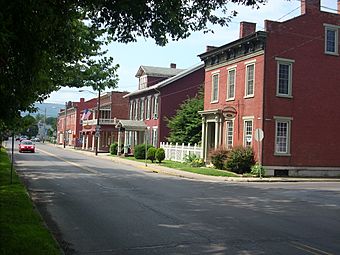Jersey Shore Historic District facts for kids
Quick facts for kids |
|
|
Jersey Shore Historic District
|
|

Jersey Shore Historic District, June 2009
|
|
| Location | Irregular shape roughly bounded by Lawshe Run, W. Branch Susquehanna River, S borough boundaries, and Tomb Ave., Jersey Shore, Pennsylvania |
|---|---|
| Area | 150 acres (61 ha) |
| Built by | Alexander Smith (Humes building) |
| Architectural style | Late Victorian, Greek Revival, Federal |
| NRHP reference No. | 75001653 |
| Added to NRHP | March 31, 1975 |
The Jersey Shore Historic District is a special area in Jersey Shore, Pennsylvania. It's like a protected neighborhood because its buildings are very old and important. This district is in Lycoming County, Pennsylvania. It includes 286 buildings that show how people lived and worked long ago.
Most of these buildings were built between 1830 and 1860. They show popular styles from that time, like Victorian, Greek Revival, and Federal architecture. This historic district was added to the National Register of Historic Places in 1975.
History of Jersey Shore
The town of Jersey Shore started a long time ago, even before the American Revolutionary War. In 1975, a historian named Dean R. Wagner studied the town's past. He found that Jersey Shore is built on land given to early settlers in the 1600s and 1700s.
This land was along the western branch of the Susquehanna River. It's about 15 miles south of what is now Williamsport, Pennsylvania. The original land areas were called Forrest Situate, Richmond Situate, Richland Situate, and Forge Hammer.
How the Town Began
Around the year 1800, two brothers, Jeremiah and Reuben Manning, moved from New Jersey. They bought part of the Forrest Situate land. Then, they planned out a new town north of what is now Allegheny Street. They first named their new town Waynesburg.
At that time, there were only four houses in the town. But many businesses were nearby, like lumber and flour mills. This meant the town was ready to grow.
Growing the Town
In 1813, William B. Smith bought land south of Allegheny Street. He then planned a new section of the town there. At first, people could reach the town by wagon and stagecoach.
In 1834, the West Branch Canal opened, making the town even easier to reach. However, the town's growth slowed down in the mid-1800s. This happened because planners decided to build the railroad on the other side of the river.
The town's name was officially changed to Jersey Shore in 1826. This historic district was added to the National Register of Historic Places in 1975.
Important Buildings
The Jersey Shore Historic District has many interesting old buildings. Here are some of the most notable ones:
- Abraham Lawshe House (built around 1840): This was the home of the person who owned Jersey Shore's biggest tannery. A tannery is a place where animal hides are made into leather.
- Gallagher-Webb House (built around 1842)
- Mark Slonaker House (built around 1845): This house belonged to one of the men who helped build a pig iron furnace in 1814.
- Stone-Nice House (built around 1845)
- Bailey-Allen House (built around 1850)
- Sanderson-Sebring House (built around 1852)
- Samuel Humes Building (built 1852): This building is named after Samuel Humes. He was on the board of directors for the Jersey Shore National Bank. He also helped with the Lewisburg Turnpike and Bridge Company.
- Moran-Trump House (built 1855)
- West Branch Dormitory Building (built 1856)
- McHenry-Cline House (built around 1885)
 | Dorothy Vaughan |
 | Charles Henry Turner |
 | Hildrus Poindexter |
 | Henry Cecil McBay |



